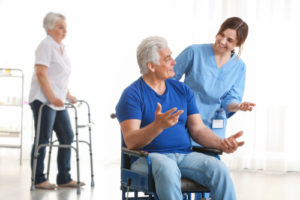Understanding the Role of Skilled Nursing Care in Rehabilitation
- Home
- CARE CENTER
- Understanding the Role of Skilled Nursing Care in Rehabilitation
Understanding the Role of Skilled Nursing Care in Rehabilitation
6 Jan, 2024
Senior Living
In the intricate landscape of rehabilitation, skilled nursing care stands as a cornerstone, playing a vital role in supporting individuals on their journey to recovery. This article aims to delve into the multifaceted role of skilled nursing care in rehabilitation, highlighting its significance in addressing the diverse needs of individuals seeking to regain their health and independence.
Assessment and Individualized Care Plans
The journey of rehabilitation often begins with a comprehensive assessment, and skilled nursing care is instrumental in this phase. Experienced nurses evaluate the physical, emotional, and cognitive aspects of each individual, forming the foundation for personalized care plans. These plans are tailored to address specific rehabilitation goals, ensuring a holistic approach to the recovery process.
Medical Management and Monitoring
Skilled nursing care in rehabilitation involves expert medical management and continuous monitoring. Whether individuals are recovering from surgery, injury, or a medical condition, nurses are adept at administering medications, managing pain, and closely monitoring vital signs. This vigilant oversight ensures that any medical issues are promptly addressed, contributing to a safe and effective rehabilitation experience.
Wound Care and Rehabilitation
For individuals recovering from surgeries or injuries, wound care is a critical aspect of rehabilitation. Skilled nurses possess the expertise to manage and dress wounds, facilitating the healing process. Their involvement is pivotal in preventing infections, minimizing complications, and promoting optimal recovery, thereby enabling individuals to focus on their rehabilitation exercises and therapies.
Coordination with Rehabilitation Therapists
Skilled nursing care operates in tandem with rehabilitation therapists to ensure a cohesive and integrated approach to recovery. Effective communication and collaboration between nurses, physical therapists, occupational therapists, and other rehabilitation professionals are paramount. This teamwork ensures that individuals receive comprehensive care that addresses both their medical and therapeutic needs.
Patient Education and Empowerment
Empowering individuals with knowledge about their condition and the rehabilitation process is a key role of skilled nursing care. Nurses educate patients and their families on prescribed medications, post-discharge care, and lifestyle adjustments. This information equips individuals with the tools they need to actively participate in their recovery, fostering a sense of empowerment and engagement in the rehabilitation process.
Emotional Support and Mental Health
The rehabilitation journey often involves not only physical healing but also emotional and mental well-being. Skilled nurses provide essential emotional support, addressing the psychological aspects of recovery. Their empathetic approach helps individuals navigate the emotional challenges that may arise during rehabilitation, promoting resilience and a positive outlook.
Transition Planning and Discharge Coordination
As individuals progress in their rehabilitation, skilled nursing care extends to comprehensive transition planning and discharge coordination. Nurses work closely with rehabilitation teams to ensure a smooth transition from the rehabilitation facility to home or another care setting. This includes arranging necessary support services, coordinating follow-up appointments, and providing individuals and their families with the resources they need for continued success post-discharge.
Continuous Evaluation and Adaptation
The role of skilled nursing care in rehabilitation is dynamic and requires continuous evaluation and adaptation. Nurses monitor progress, assess changing needs, and adjust care plans accordingly. This flexibility ensures that individuals receive the most effective and tailored care throughout the rehabilitation process.
Skilled nursing care serves as a linchpin in the intricate tapestry of rehabilitation. From initial assessments to continuous monitoring, wound care, collaboration with rehabilitation therapists, patient education, emotional support, transition planning, and ongoing evaluation, skilled nursing care encompasses a comprehensive range of responsibilities. By understanding and appreciating the multifaceted role of skilled nursing care in rehabilitation, we acknowledge its pivotal contribution to fostering successful recoveries and empowering individuals on their path to restored health and independence.

Leave a Comment